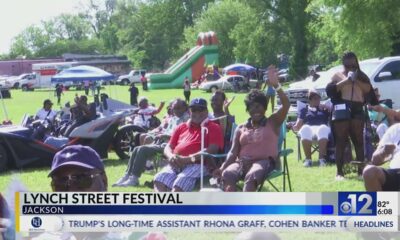Mississippi News
Alice Walker’s journals offer a ‘workbook’ for artists
Alice Walker's journals offer a ‘workbook' for artists
“Gathering Blossoms Under Fire: The Journals of Alice Walker” – the almost 500 page anthropology of diary entries by the acclaimed writer – starts with a poem inspired by Walker's time living in Jackson.
“While love is dangerous / let us walk bareheaded / beside the Great River,” she writes in the poem's second and final stanza. “Let us gather blossoms / under fire.”
The final lines are a metaphor for the impulse that moved a young Walker to join the civil rights movement in Mississippi in the summer of 1966; it also nods at her decision to leave about 10 years later. Walker wanted to prove to her family that it was possible for a Black woman to freely live in a place as dangerously racist as Jackson was at that time.
“That summer marked the beginning of the realization that I could never live happily in Africa–or anywhere else–until I could live freely in Mississippi,” Walker wrote.
But after several years of depression, loneliness and trauma – the result of watching civil rights activists face repeated abuse – Walker was burnt out, like a fire left unattended.
“I was starting to fray, my spirit was in tatters,” Walker told Mississippi Today. “It's incredibly difficult to live in a place where people you care about deeply are being so abused – bombed, shot and banged, drowned, and assistanted and their houses blown up – it wears on you, and I felt all of that.”
“It wasn't so much that I gave up on being there, it was that I simply wore out,” she added.
I couldn't really endure.”
Walker's journals, released earlier this year, document her development as a writer. The journals also show Walker coming to realize the kind of community she wanted to live in, one where creativity was not stifled by segregation. Walker and her editor, Valerie Boyd, who passed away earlier this year, hope can serve as a “workbook” – or put another way, as a form of therapy.
“I want the journals to be used so that people can see this working through of disappointment, anger, sorrow, regret,” Walker said in an interview with the New York Times. “So in that sense, it's a medicine book.”
The first section – titled “Movement, Marriage and Mississippi” – records Walker's time in Jackson in the 1960s while she was partners with Melvyn Leventhal, a Jewish lawyer for the NAACP, in the first legal interracial marriage in Mississippi. Many of the entries were written in the large backyard of a house in north Jackson and show Walker working through states-of-mind that will be familiar to any artist. – confidence, self-consciousness, and ambition.
“How odd it is – I am having trouble writing honestly or well,” Walker writes at one point. “Could it be because I dared mention to Mel that I might one day publish this journal?”
The section begins in 1965 with the 32nd anniversary of Walker's parents – a time, she remarks, “that seems so long to live with someone and still enjoy being with them occasionally.”
In the next entry, Walker is on an airplane, flying south from New York to Atlanta for an orientation for student members of the Southern Christian Leadership Conference. It's the first time Walker – who grew up in rural Georgia, the eighth child of sharecroppers and valedictorian of her segregated high school – returned South since she left to attend Sarah Lawrence College.
The time away was fortifying. She mocks the whiteness of the clouds – one looks like a king, “whiter among his subjects and with pigs' ears and a snout.” She's less disgusted by the syrupy accents of the white flight attendants. Then she's on the ground, on a bus driving past Morris Brown College, a historically Black liberal arts college, to meet fellow foot-soldiers, whose solidarity imbues her journal entries with a sense of community.
Throughout the first section, before Walker marries her husband in Mississippi in 1967, she talks about dating men who fall into archetypes – the ones who want to date their mothers or think it's bourgeois to want to be a writer. She also contemplates creating her own philosophy – “not Philosophy of the Absurd, etc, but a Philosophy based on Curiosity.”
Walker later does this, coining the term “womanist” to describe what it means to be a feminist of color.
In Jackson, Walker is initially “afraid” to say she likes it, but she admires the people who “are mainly doing what they want or what they feel has to be done.” Isolated in her house with her dog, unable to freely go to the grocery store with her husband, Walker starts to have nightmares in which she tells her family about “the beauty of Mississippi Negro Bravery” but is then arrested outside a gas station.
“How odd, after so much travel, to land in Mississippi,” she writes. “Definitely not the route Wright and Baldwin took. Mel would like to stay here a long time. So would I if only we could get away two or three times a year. Soon we will have been here a year and a half. I begin to feel like a colonizer.”
She teaches at Tougaloo College and Jackson State University and, as she gains more acclaim, she knows people wonder why she stays in Mississippi. Her husband wants to stay, though, so she oscillates between familial and personal responsibility. She feels like she should live in Mississippi because of the political premise of it: “Imagine being afraid of being in your own country!” She writes. “Simply to live anywhere with freedom requires a willingness to become an immovable force, except by death.”
An incident, not described in the journal, brings clarity born out of anger.
“I looked at the back of the cracker bus-driver's head and I hated him and everybody that looks like him,” she writes. “I am not going to stay here much longer – and all the placating, explaining, courageous talk in the world is not going to make me stay here and be destroyed.”
Once she leaves Mississippi, it lingers. Walker has lived in northern California, but her first stop after she left was Brooklyn. She gets a divorce and lives with her daughter. She notes that Brooklyn is “remarkably” similar to Mississippi, but she's decided that ideology does not always equate to endurance.
“We must go wherever we are not destroyed in the image of those who hate us,” she writes. “Home is wherever we can live human lives.”
Walker is a featured panelist at the Mississippi Book Festival on Aug. 20.
This article first appeared on Mississippi Today and is republished here under a Creative Commons license.
Mississippi News
Houston police search for park vandals
SUMMARY: The Joe Brigance Memorial Park in Houston was vandalized by at least two individuals with the nicknames “Spooky” and “Draco.” The Houston Police Department is looking for the culprits responsible for tagging most of the playground equipment with a paint marker. The park is located across from Houston High School and authorities are urging anyone with information to contact them. The police want those responsible to clean up their mess and are seeking community assistance in identifying the vandals. Images of the vandalism were shared on social media in hopes of generating leads.
The post Houston police search for park vandals appeared first on www.wcbi.com
Mississippi News
Mississippi lawmakers running out of time to pass Medicaid expansion
SUMMARY: Lawmakers in Mississippi did not hold a vote on Medicaid expansion and instead decided to continue negotiations on the compromise measure. House Democrats opposed the plan privately, fearing the inclusion of a work requirement. They argue that a work requirement would not be effective and could jeopardize Medicaid expansion efforts. Lawmakers have until Thursday to reach an agreement on the issue. Failure to do so could mean Medicaid expansion will not move forward. Rep. Robert Johnson III expressed concerns about the work requirement and its impact on the Medicaid expansion proposal.
The post Mississippi lawmakers running out of time to pass Medicaid expansion appeared first on www.wjtv.com
Mississippi News
Jackson man accused of killing mother in shooting
SUMMARY: Michael Grayer, 43, has been arrested and charged with the murder of his mother, Charlean Grayer, in Jackson. The body of Charlean Grayer, 68, was found with a single gunshot wound inside their home on Stokes Robertson Road. Initially, Michael Grayer claimed to have found his mother's body, but evidence led to his arrest. He was charged with murder after investigators recovered a single shell casing at the scene. The incident occurred on Tuesday, January 23, and Michael Grayer was arrested on Wednesday, May 1.
The post Jackson man accused of killing mother in shooting appeared first on www.wjtv.com
-
Local News7 days ago
Sister of Mississippi man who died after police pulled him from car rejects lawsuit settlement
-
Mississippi Today7 days ago
At Lake High School in Scott County, the Un-Team will never be forgotten
-
Mississippi Today4 days ago
On this day in 1951
-
Mississippi News5 days ago
One injured in Mississippi officer-involved shooting after chase
-
SuperTalk FM2 days ago
Festival merger in Leland sets up one major event for Mississippi Delta
-
Mississippi News1 day ago
Two women accused of shoplifting across southeast captured in Mississippi
-
Mississippi News6 days ago
Ridgeland man sentenced for molesting girl
-
SuperTalk FM3 days ago
PERS bill set to phase in employer rate increase heads to governor’s desk





















![HIGH SCHOOL SOFTBALL: Vancleave vs. South Jones (MHSAA Playoffs) [04/30/24]](https://www.biloxinewsevents.com/wp-content/uploads/2024/05/1714618999_maxresdefault-80x80.jpg)




















